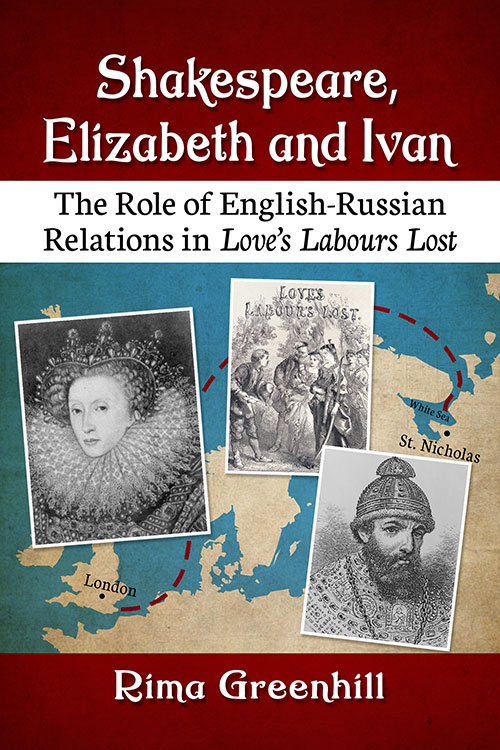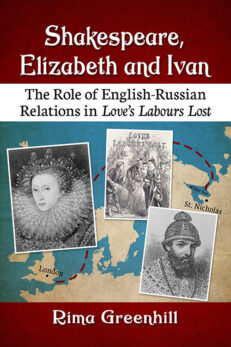Shakespeare, Elizabeth and Ivan
The Role of English-Russian Relations in Love’s Labours Lost
$65.00
In stock
About the Book
Shakespeare’s comedy Love’s Labour’s Lost has perplexed scholars and theatergoers for over 400 years due to its linguistic complexity, obscure topical allusions and decidedly non-comedic ending. According to traditional interpretations, it is Shakespeare’s “French” play, based on events and characters from the French Wars of Religion.
This work argues that the play’s French surface conceals a Russian core. It outlines an interpretation of Love’s Labour’s Lost rooted in diplomatic and trade relations between Russia and Elizabethan England during the dramatic decades following England’s discovery of a northern trade route to Muscovy in 1553. Drawing on original research of 16th-century sources in English, Latin and French, the text also surveys Russian sources previously unavailable in translation. This analysis provides new explanations for some of the play’s previously most enigmatic elements, such as its unconventional ending, the significance of its secondary characters, linguistic anomalies and the Masque of the Muscovites itself.
About the Author(s)
Bibliographic Details
Rima Greenhill
Format: softcover (6 x 9)
Pages: 264
Bibliographic Info: 29 photos, notes, bibliography, index
Copyright Date: 2023
pISBN: 978-1-4766-8482-6
eISBN: 978-1-4766-4800-2
Imprint: McFarland
Table of Contents
Timeline: Historical Events in England, Russia and Europe, 1530–1649 ix
Preface 1
Introduction 5
Part I—Love’s Labors: Mary, Elizabeth and Ivan, 1553–1584
1. Seasick Coming from Muscovy 14
2. What Buys Your Company? 25
3. The Ambassadors of Love 42
4. The Armipotent Mars 52
5. The Empress of Muscovy 62
6. The Soldier, the Clown and the Wench 83
Part II—Labors Lost: Elizabeth and Godunov, 1584–1598
7. The Curate, the Pedant and the Boy 110
8. A Feast of Languages 126
9. Heirs of All Eternity 145
10. The Pageant of the Nine Worthies 165
Epilogue: You This Way, We That Way 183
Chapter Notes 191
Bibliography 227
Index 239
Book Reviews & Awards
• “Shakespeare’s multivalence is thrown into high relief with this surprising yet convincing interpretation of Love’s Labour’s Lost by Rima Greenhill. Many have been content to love the play for its delight in language and its empowerment of women, but Greenhill exposes a layer of political satire tied to England’s increasingly fraught trade relationship with Russia, beginning with Ivan the Terrible and continuing through Boris Godunov. …[a] substantial contribution to scholarship…highly recommended”—Choice
• “Greenhill has rediscovered a remarkable and consequential original context for one of Shakespeare’s most enigmatic and difficult plays.”—Roger Stritmatter, professor of humanities, Coppin State University
• “Love’s Labours Lost is filled with puzzles and lost in-jokes, until now, with the author having discovered the key: insider Elizabethan court knowledge within the further context of 16th-century Anglo-Russian diplomatic relations. The author’s comprehension of the entire history of the scholarship, criticism, and theater history concerning the play, and of Russian history and language, is detailed and thorough. This work thus solves a 400-year-old problem.”—Michael Delahoyde, professor of English, Washington State University
• “Greenhill’s work is a revelation for scholars of early modern England and Russia, demonstrating through the plays of Shakespeare just how widespread knowledge of foreign lands was among the populace in England. British merchants in the Muscovy Company had been trading with Moscow since the 1550s; clearly that trade had made a broad social impact in Elizabethan society. That Shakespeare could assume his audience understood his references to far-off ‘Muscovy’ underscores how avidly the English populace was connected to the broader European world. This book uncovers the subtle understandings of Russia in the British populace, doing so with comprehensive mastery of the sources.”—Nancy S. Kollmann, professor of early modern Russian history, Stanford University, author of Crime and Punishment in Early Modern Russia
• “Working through the archives of the diplomatic history of the relations between Elizabeth’s England and Ivan the Terrible’s Russia, Rima Greenhill has discovered a trove of sources on Russian-English relations in the period that were overlooked by scholars working in English and Russian. In her book manuscript, she demonstrates that Shakespeare’s Love’s Labour’s Lost contains a masked set of allusions to Elizabeth’s interest in Russo-British trade, to the events that occurred when Ivan’s ambassadors visited England, and to the Russian language itself, as heard by Elizabethans. Surprising but convincing, her conclusions draw on her rich documentary evidence as well as the literary traces of linguistic contact; her work allows this enigmatic play finally to make sense.”—Gabriella Safran, professor of Russian and Jewish literature, chair of the department of Slavic languages and literatures, Stanford University; author of Recording Russia: Trying to Listen in the Nineteenth Century
• “With her knowledge of the Russian alphabet, etymologies, customs, and the personalities involved, Greenhill seems able to explain every bizarre detail and phrase in Loves Labours Lost. … Prospective readers will find themselves on a thrill-ride that newly dazzles them with Shakespeare’s brilliance. … In Rima Greenhill’s Shakespeare, Elizabeth and Ivan, you can enjoy for the first time Shakespeare’s labors on Love’s Labours Lost found.”—The Shakespeare Oxford Newsletter
• “A pioneering and revelatory new interpretation of the most perplexing of Shakespeare’s comedies… Greenhill’s mastery of the sources—mostly unknown and inaccessible to Shakespearean scholars and probably beyond their imagination—is singularly impressive. This is not a study based on speculative interpretation, but hard and persuasive evidence beyond the range of those who have traditionally dominated Shakespearean scholarship. … A fascinating read, strongly recommended.”—Jus Gentium: Journal of International Legal History





